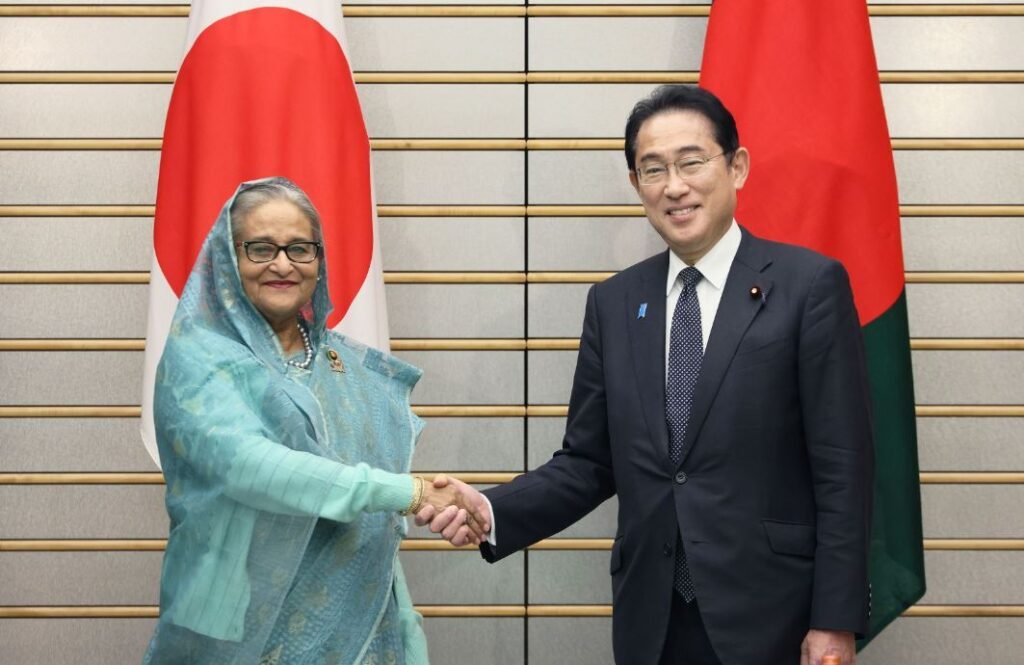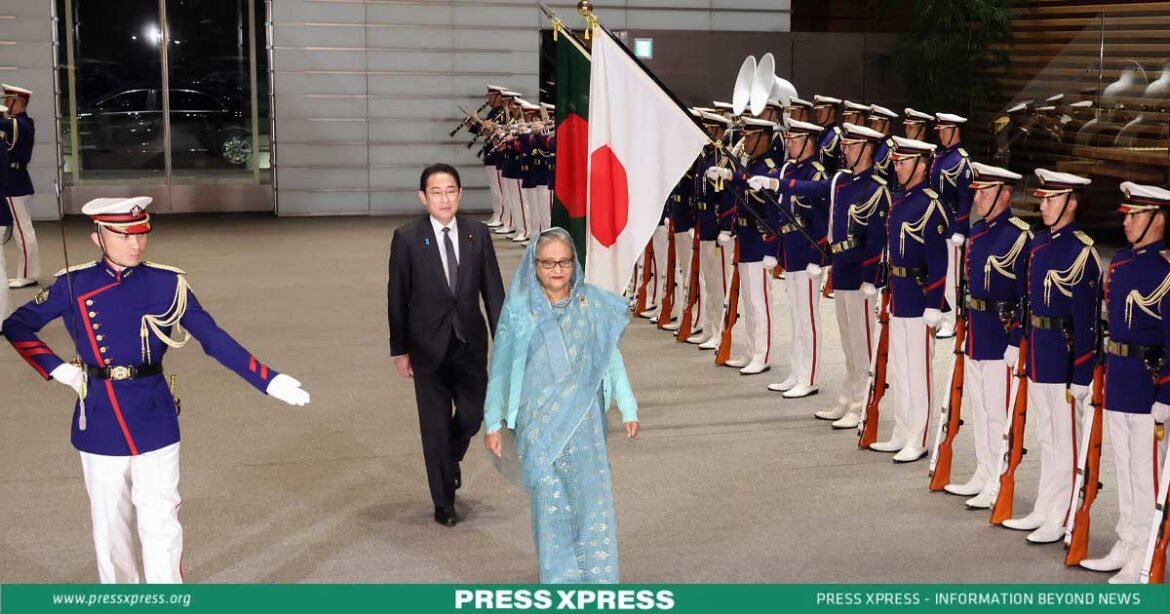Japan has recently disclosed its selection of Bangladesh as one of the four countries to benefit from Official Security Assistance.
Bangladesh and Japan have been maintaining a bold relationship over mutual support and cooperation, and this has also produced excellent results and deepened trust between the two governments. In the private economic sector, bilateral relations are becoming increasingly strong and diverse. An agreement on the promotion and protection of investment between Japan and Bangladesh came into force in 1999. However, in recent days, it has entered into a new phase of defense aid collaboration. This was happening while Bangladesh took a move to modernize its military structure and Japan came forward as its trusted and tested partner to support.
Japanese Ambassador to Bangladesh, Iwama Kiminori, made a significant announcement in August that raised eyebrows in diplomatic circles. Japan had chosen Bangladesh as one of four countries to receive defense aid under the Official Security Assistance (OSA) program. This initiative is designed to provide equipment, supplies, and infrastructure development assistance to partner countries through grants, aiming to reinforce the region’s comprehensive defense architecture.
The Japanese Foreign Ministry emphasizes the need to enhance defense capabilities and security cooperation in the Indo-Pacific region to prevent unilateral forceful changes to the status quo and maintain peace. Japan established Official Security Assistance (OSA) to support armed forces and related organizations with materials, equipment, and infrastructure development based on security needs, alongside Official Development Assistance (ODA) for economic and social development.
OSA
Japan’s new National Security Strategy, approved in December 2022, includes OSA, and this was acknowledged during a meeting between Sheikh Hasina and Japanese Prime Minister Kishida Fumio in April. They highlighted the importance of OSA in strengthening security cooperation.
Both leaders praised the regular port visits by the Japan Maritime Self-Defense Force (JMSDF) in Chittagong and high-level bilateral visits by the Bangladesh Armed Forces and Japan Self-Defense Forces. They committed to promoting security cooperation through unit-to-unit exchanges, training programs, and goodwill exercises, following a Memorandum of Cooperation and Exchanges between defense authorities.
The discussions concerning a Transfer of Defense Equipment and Technology agreement were commended for their promising outlook. Japan is actively pursuing initiatives and strategies to strengthen its defense capabilities and diplomatic outreach. This aligns well with Bangladesh’s aspiration to modernize its armed forces as outlined in the Forces Goal 2030. Undoubtedly, both nations’ endeavors to fortify regional security were duly recognized.
Bangladesh-Japan Strategic Partnership
In April 2023, the visit of Bangladeshi Prime Minister Sheikh Hasina to Japan marked a pivotal moment in the ongoing relationship between the two nations. During her visit, they upgraded their partnership from being “comprehensive” to “strategic,” underlining the growing importance of their ties. The central objective of the visit was to enhance economic and interpersonal connections, highlighted by the creation of a Joint Study Group in April 2023. This group’s purpose is to investigate the potential for a Japan-Bangladesh Economic Partnership Agreement (EPA).

Economically, Japan has a long history of strong ties with many Asian countries, including Bangladesh. Bangladesh is the second-largest recipient of development and economic assistance from Japan after India, having received around $25 billion in Japanese development and economic aid since 1972.
Then in addition to the economic cooperation, what makes Japan extend defense aid collaboration? In fact, Japan’s new National Security Council Strategy (NSS), together with the National Defense Strategy (NDS) and the Defense Building Program (DBP), were all released on December 16, 2022. These entail several unprecedented and highly ambitious projects relevant to Japan’s own defense capabilities. Japan should urgently revamp its military force in light of today’s acute security environment, particularly due to the Russian invasion of Ukraine, tension over the Taiwan Strait generated by China, and the nuclear and missile ambitions of a more provocative North Korea. The NSS constitutes a dramatic transformation of Japan’s national security policy and illustrates growing threat perceptions in the minds of the Japanese people.
However, the dramatic transformation is not about “fundamental principles and policies” but rather about the execution of the initiatives in the strategy documents. In fact, the basic three pillars of national security policy remain essentially intact. The goals are clearly stated in the NDS: (1) “to strengthen Japan’s own architecture for national defense”; (2) “to further reinforce joint deterrence and response capability of the Japan-U.S. Alliance”; and (3) “to reinforce collaboration with like-minded countries.”
The basic construct of the defense buildup also remains the same. The NDS states, “Japan will fundamentally reinforce the current Multi-Domain Defense Force through further accelerated efforts.” Thus, the course of Japan’s national security policy is not a fundamental shift of trajectory but an acceleration of the previous course of action, provoked by the recent deterioration of the security environment. In this sense, the dramatic transformation is not a revolution but an evolution with a giant leap.
This picture projects how the Japan-U.S. alliance and Japan’s security cooperation with other like-minded countries should proceed by the three national security documents and contribute to building a regional security architecture to encounter China and North Korea in this zone. To see it more explicitly, we need to know the Chinese defense factors in the Pacific region.
Why China is a Factor?
Indeed, the choice of Bangladesh, along with the Philippines, Fiji, and Malaysia, for OSA defense cooperation is not coincidental. These countries share a common concern: the increasing assertiveness of China in the region.
The Philippines have been involved in territorial disputes and skirmishes with China’s People’s Liberation Army, coast guard, and maritime militia vessels in the South China Sea. Meanwhile, Fiji shares Japan’s concerns about the growing Chinese influence in and around the Pacific Islands. This shared unease about China’s actions in their respective regions has led to a strengthening of defense cooperation with Japan.
Geopolitical Balancing Act
While Bangladesh’s relations with Japan are growing, its ties with the United States have entered a troubled phase in recent years. Washington has criticized human rights violations in Bangladesh, leading to sanctions on Bangladeshi security officials and visa denials for various officials, politicians, and members of law enforcement agencies. U.S. Secretary of State Antony Blinken’s concerns about developments in Bangladesh, particularly the need for free and fair elections, have strained relations further.
In response to this, Prime Minister Sheikh Hasina accused the U.S. of seeking regime change in Bangladesh and questioned the U.S.’s commitment to democratic norms. While the U.S. has increased its criticism, it is likely that India, which has close ties with both Washington and Dhaka, will remain quiet amid this diplomatic tension.
While examining the US invitation to Bangladesh over QUAD joining, Bangladesh is maintaining its own agenda of not getting engaged with any military ally like QUAD. In this very situation, according to defense analysts, Japan is playing remotely to develop defense collaboration ties with Bangladesh to justify the whole parameter as an innocent partnership between these two countries.
Japan’s efforts to transfer military surveillance equipment contribute to regional stability and reflect the QUAD’s commitment to ensuring security in the region. This move offsets the temporary strain in relations between Washington and Dhaka, especially when New Delhi chooses to maintain a pragmatic alliance with Dhaka.
In the context of Bangladesh’s evolving international relationships, there are significant disparities between its interactions with the United States and its engagement with the QUAD, specifically Japan. While Bangladesh’s ties with Japan continue to flourish, its relationship with the United States has entered a turbulent phase in recent years.
Bangladesh’s reasons for joining OSA
Bangladesh’s decision to join the Ocean Security and Awareness (OSA) initiative stems from its commitment to safeguarding marine resources and promoting maritime security. As a nation highly dependent on its coastal waters for livelihoods and trade, Bangladesh recognizes the pressing need to address ocean-related challenges. Joining OSA enables Bangladesh to collaborate with international partners, share information, and develop strategies to counter maritime threats such as illegal fishing, pollution, and piracy.
Moreover, OSA provides a platform to enhance scientific research, contributing to a deeper understanding of ocean dynamics and climate change impacts. By participating in OSA, Bangladesh aims to secure its maritime interests, support sustainable ocean management, and strengthen its role in regional and global ocean governance.


